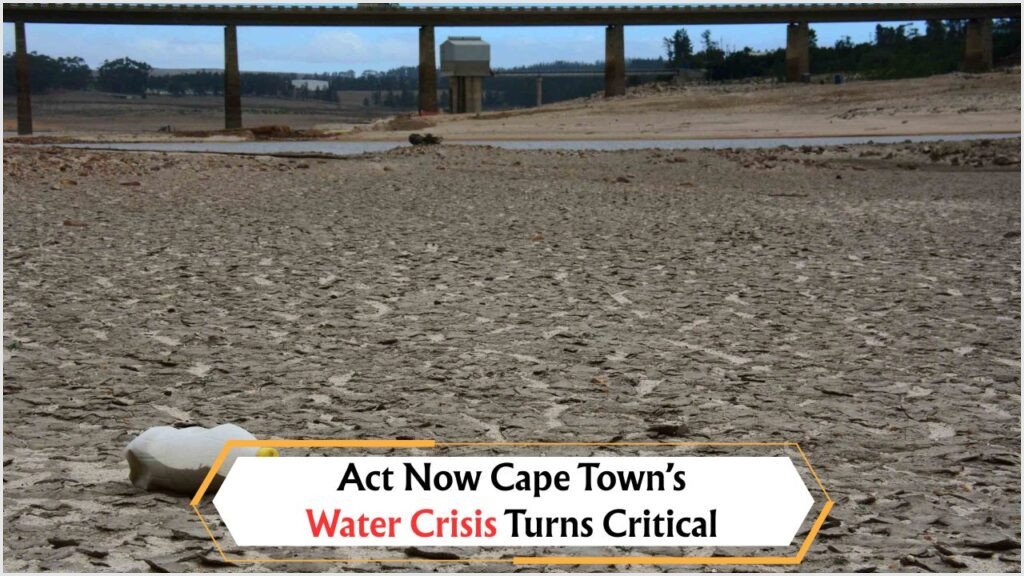August 2025 Water Crisis: Cape Town Faces Day Zero Emergency as Dam Levels Plummet to 34.8%
Understanding the Severity of Cape Town’s August 2025 Water Crisis
Water Crisis in Cape Town: The August 2025 water crisis in Cape Town has reached a critical point as dam levels have plummeted to a mere 34.8%, pushing the city towards a Day Zero emergency. This looming disaster is reminiscent of the 2018 crisis that threatened to shut off taps in the metropolitan area. The current situation has prompted immediate intervention from local and national authorities to prevent a catastrophe. Water restrictions are being tightened, and residents are urged to conserve water aggressively. The city is once again at the forefront of global discussions on water scarcity and climate change, highlighting the urgent need for sustainable water management practices.
- Implementing stricter water restrictions
- Encouraging community water-saving initiatives
- Exploring alternative water sources
Efforts to Increase Water Supply
| Strategy | Description | Timeframe | Expected Outcome | Challenges |
|---|---|---|---|---|
| Desalination | Converting seawater to potable water | 6 months | 15% increase in supply | High cost |
| Groundwater extraction | Tapping into underground water reserves | 3 months | 10% increase in supply | Ecological impact |
| Rainwater harvesting | Collecting rainwater for use | Immediate | 5% increase in supply | Weather dependency |
| Wastewater recycling | Reusing treated wastewater | 1 year | 20% increase in supply | Public perception |
| Water conservation campaigns | Public education on saving water | Ongoing | Reduction in consumption | Behavior change |
| Infrastructure repair | Fixing leaks in water systems | 2 years | Significant water savings | High initial investment |
The Role of Climate Change in Cape Town’s Water Crisis
Climate Change’s Impact on Cape Town’s Water Levels
Climate Impact: The role of climate change in exacerbating Cape Town’s water crisis cannot be overstated. Increased temperatures and prolonged droughts have drastically reduced the replenishment of reservoirs, while erratic rainfall patterns have made water supply unpredictable. These climatic changes are contributing to the depletion of dam levels, creating a precarious situation for Cape Town’s residents. The city’s dependence on seasonal rains for its water needs has become increasingly unsustainable, prompting a reevaluation of water management strategies.
- Rising temperatures increase evaporation rates
- Erratic rainfall disrupts water supply predictability
- Frequent droughts reduce water availability
- Climate change necessitates innovative solutions
Community Efforts in Combatting the Water Crisis
- Local water-saving initiatives
- Community education programs
- Adoption of water-efficient technologies
- Collaboration with local government
Proactive Measures to Prevent Future Water Crises in Cape Town
Future-Proofing Water Supply: To prevent future water crises, Cape Town is taking proactive measures that aim to secure a sustainable water future. These initiatives include the expansion of desalination plants, investment in water recycling infrastructure, and the promotion of water-efficient practices among residents. By diversifying its water sources and implementing forward-thinking policies, the city hopes to mitigate the impact of climate change and population growth on its water resources.
Investment in Water Infrastructure
| Initiative | Goal | Timeline | Estimated Cost |
|---|---|---|---|
| Desalination expansion | Increase potable water supply | 5 years | ZAR 3 billion |
| Wastewater treatment upgrade | Enhance recycling capabilities | 3 years | ZAR 1.5 billion |
| Leakage reduction programs | Minimize water waste | 2 years | ZAR 500 million |
| Public awareness campaigns | Promote water-saving habits | Ongoing | ZAR 200 million |
| Rainwater harvesting systems | Increase water reserves | 4 years | ZAR 800 million |
Community Involvement in Mitigating Cape Town’s Water Challenges
Community Actions: Community involvement is crucial in addressing Cape Town’s water challenges. Residents and local organizations are actively participating in water conservation efforts, from reducing household water usage to volunteering in local water-smart gardening projects. These initiatives not only help alleviate the immediate crisis but also foster a culture of sustainability that is vital for long-term water security.
Steps for Individuals to Conserve Water
- Install low-flow showerheads
- Fix leaks promptly
- Use greywater systems
- Adopt water-efficient appliances
Community Projects Making a Difference
- Water-smart community gardens
- Neighborhood water audits
- School water conservation programs
- Local rainwater collection systems
Innovative Solutions to Cape Town’s Water Crisis
Innovative Approaches: Cape Town is exploring various innovative solutions to combat its ongoing water crisis. These include harnessing technology for better water management, utilizing data analytics for efficient resource distribution, and adopting renewable energy in water treatment processes. These solutions aim to create a resilient water system that can withstand future climatic and demographic challenges.
Technological Innovations in Water Management
- Smart water meters for real-time monitoring
- Advanced leak detection systems
- AI-driven water distribution networks
- Solar-powered desalination plants
- IoT sensors for water quality assessment
- Blockchain for water rights management
- Cloud-based water resource management platforms
Lessons Learned from Cape Town’s Water Crisis
Key Lessons: Cape Town’s experience with water scarcity offers valuable lessons for other regions facing similar challenges. The importance of proactive planning, community engagement, and the integration of technology in water management cannot be understated. These efforts highlight the need for a comprehensive approach to water security that balances environmental, economic, and social factors.
| Lesson | Application | Outcome | Challenges |
|---|---|---|---|
| Proactive planning | Developing long-term strategies | Better crisis management | Resource constraints |
| Community engagement | Fostering public participation | Increased awareness | Coordination efforts |
| Technology integration | Utilizing modern tools | Efficient water use | Cost implications |
| Policy innovation | Updating regulations | Adaptive governance | Bureaucratic inertia |
FAQs on Cape Town’s Water Crisis
What is Day Zero?
Day Zero refers to the day when Cape Town’s municipal water supply is expected to run out, resulting in severe water restrictions and the need for residents to collect a limited water supply from designated points.
How is the government addressing the water crisis?
The government is implementing a range of measures including stricter water restrictions, investment in desalination plants, and public awareness campaigns to encourage water conservation.
What can residents do to help?
Residents can help by reducing their water usage, fixing leaks, installing water-efficient fixtures, and participating in community water-saving initiatives.
How does climate change affect water scarcity?
Climate change contributes to water scarcity by increasing temperatures, leading to higher evaporation rates, and causing irregular rainfall patterns that disrupt water supply.
Are there any long-term solutions being considered?
Yes, long-term solutions include expanding desalination capacity, improving wastewater recycling, and investing in water-efficient infrastructure to ensure a sustainable water future.





